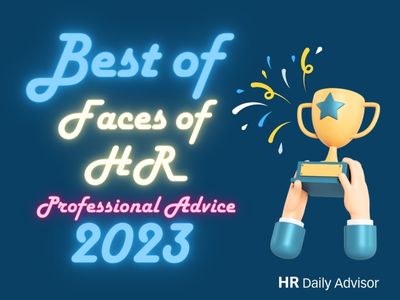As we say goodbye to 2023 and look toward a new year, we couldn’t be more excited to share timely news and commentary with our dedicated HRDA audience. For our Faces of HR column this week, we look back at some of our favorite Faces and share their expert insights from the front lines of creating better workplaces.
So, what is these experts’ advice for people entering the HR profession?
Courtney Bass Sherizen, Chief Talent and Culture Officer at the Wikimedia Foundation, a nonprofit that operates Wikipedia and other Wikimedia free knowledge projects, shared with HR Daily Advisor that her biggest advice is to take the time to learn about as many facets of HR as you can.
“Early HR professionals are sometimes encouraged to move quickly from being a generalist to a specialist, but I think it’s in your time as a generalist that you get to understand how HR, as a system, can best be designed, implemented, and improved,” Sherizen says.
Susan Lowe, Chief People & Sustainability Officer at Fuel50, a skills-powered talent marketplace, agrees. “Never stop learning – be curious, ask questions, read (lots), network, and invest in your professional development,” Lowe shared. “Also, know your why, and what you are passionate about within HR and then find your tribe. HR roles and People & Culture organizations can differ greatly, if you find one aligned to your values and the impact you want to have, this will make a difference to your learning and your own employee experience.”
Robert Boersma, Head of Strategy North America at international job search website Talent.com, takes it a step further, valuing the importance of listening.
“Listen deeply, then listen again. Ask “how” and “why” questions,” Boersma explained. “HR sets the tone for the workplace, and it all starts by understanding what people want and expect. Expectations are a funny thing; they can represent minor things but have real impact. Encouraging open communication and building rapport with the people around you are the first steps to being a great recruiter or HR person. People take jobs because of money, but they leave them because of bad managers. Recruiters need to recruit people who stay, and HR needs to create a sticky place to work. Leading by example is the best first step to achieving this, and it all starts with something free: listening.”
Gianna Driver,CHRO at Exabeam, a global cybersecurity leader in Next-gen SIEM and XDR, says if you don’t have a HR background don’t count yourself out.
“I think, years ago, entering HR had more of a path if you will,” Driver says. “It was you start doing perhaps some of the administrative elements, employee files, and things – then you work your way up. But beautifully, what I would say is we live in a time and place where you don’t have to come from traditional backgrounds. In fact, I think there’s a lot of value for HR practitioners to have atypical, non-standard backgrounds. So, what I would encourage people to do is ask themselves, what is it that gives them energy? What is it that they truly enjoy doing? And if that is something that makes them think, “Oh, I’d like to enter the HR space and field,” fabulous, give it a try.”
She also noted that if you realize you don’t like what you’ve tried, don’t be afraid to pivot and try another aspect of HR. “I think a lot of people think of HR as just being an HR business partner, but no, the field of HR and people encompass people analytics,” she continued. “It encompasses total rewards, which is compensation and benefits. It encompasses learning, development, diversity, equity, inclusion, and belonging. It’s a very broad and wide field. So, I would say, for folks interested in joining, go and try it, go and get involved and see. We want more amazing people in this field.”
Last but not least, Eric Cormier, manager of HR services for Insperity, a provider of HR solutions, says no matter what you do, shake it up. “Bring your own style and brand to your HR role,” Cormier says. “Be adventurous, and don’t be the run-of-the-mill HR person. Be different. I would love to see people not cringe when you tell them your profession. I think people entering the profession should work to change how people view HR, break the stigma, and bring their authentic selves to the field.”


